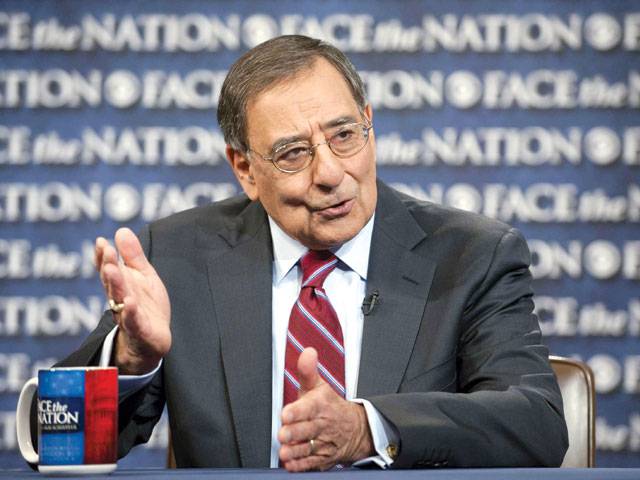WASHINGTON - The United States will respond if Iran tries to close the strategic Strait of Hormuz at the entrance to the Gulf, US Defence Secretary Leon Panetta warned Sunday, saying such a move would cross a “red line.”
“We made very clear that the United States will not tolerate the blocking of the Straits of Hormuz,” Panetta told CBS television. “That’s another red line for us and that we will respond to them.” Panetta was seconded by General Martin Dempsey, the chairman of the Joint Chiefs of Staff, who said Iran has the means to close the waterway, through which 20 percent of the world’s oil passes.
“But we would take action and reopen the Straits,” the general said on the same show, “Face the Nation.”
Their comments follow Iranian threats to close the strait if the European Union goes through with an embargo on Iranian oil, the latest step to pressure Tehran to give up a nuclear programme that the West suspects is aimed at gaining atomic weapons.
Panetta said Iran was laying the groundwork for making nuclear weapons someday, but is not yet building a bomb and called for continued diplomatic and economic pressure to persuade Tehran not to take that step. As he has previously, Panetta cautioned against a unilateral strike by Israel against Iran’s nuclear facilities, saying the action could trigger Iranian retaliation against US forces in the region.
“We have common cause here” with Israel, he said. “And the better approach is for us to work together.”
Panetta’s remarks on CBS’ Face the Nation, which were taped Friday and aired Sunday, reflect the long-held view of the Obama administration that Iran is not yet committed to building a nuclear arsenal, only to creating the industrial and scientific capacity to allow one if its leaders to decide to take that final step.
Iran says its nuclear programme is only for energy and medical research, and refuses to halt uranium enrichment
A leading hardline Iranian newspaper reported Sunday that Iran has begun uranium enrichment at a new underground site well protected from possible airstrikes.
In a talk at a Brookings Institution forum in December, Panetta said an attack on Iran’s nuclear facilities would “at best” delay Iran’s nuclear programme by one or two years. Among the unintended consequences, he said, would be an increase in international support for Iran and the likelihood of Iranian retaliation against US forces and bases in the Mideast. Panetta did not discuss the issue directly on Sunday’s “Face the Nation.” But Chairman of the Joint Chiefs of Staff Gen Dempsey said that he wanted the Iranians to believe that a US military strike could wipe out their nuclear programme.
“I absolutely want them to believe that’s the case,” he said.
Panetta did not rule out launching a pre-emptive strike.
“But the responsible thing to do right now is to keep putting diplomatic and economic pressure on them to force them to do the right thing,” he said. “And to make sure that they do not make the decision to proceed with the development of a nuclear weapon.”
Panetta said if Iran started developing a weapon, the US would act. “I think they need to know that - that if they take that step - that they’re going to get stopped.”
Panetta cautioned global rivals not to misjudge US plans to slash military spending over the next decade, saying America would still field the world’s strongest military and nobody should “mess with that.”
Panetta also reminded Republican presidential contenders who have criticised the Pentagon’s new military strategy that the decision to cut $487 billion in defence spending was made by a bipartisan Congress.
“I think this country has to deal with the reality of the situation that we’re confronting,” Panetta said. “We’re coming out of a decade of war. We’re facing a huge budget crisis in this country. The Congress said ... we have to reduce the defence budget by $487 billion.”
Gen Dempsey told “Face the Nation” he worried that some countries might misunderstand the debate Americans are having over changing strategy and the need to cut defence spending.
“There may be some around the world who see us as a nation in decline, and worse, as a military in decline. And nothing could be further from the truth,” Dempsey said.
He said such a miscalculation could be “troublesome” in dealing with countries like Iran or North Korea but it could also cause close friends to wonder if the United States would continue to be a consistent ally.
“What I’d like to say right now is we’re the same partner we’ve always been, and intend to remain that way,” Dempsey said.
Panetta said US rivals should not misunderstand the situation.
“I think the message that the world needs to understand is: America is the strongest military power and we intend to remain the strongest military power and nobody ought to mess with that,” he said.
Friday, April 19, 2024
US ready if Iran blocks oil route

President calls for meaningful dialogue to end polarisation
April 19, 2024
KP minister briefed on issues about sales tax on services
April 19, 2024
64th anniversary of freedom fighter Mirzali Khan marked
April 19, 2024
893,000 students appear in SSC exams in KP
April 19, 2024
Hepatitis Challenge
April 18, 2024
IMF Predictions
April 18, 2024
Wheat War
April 18, 2024
Rail Revival
April 17, 2024
Addressing Climate Change
April 17, 2024
Justice denied
April 18, 2024
AI dilemmas unveiled
April 18, 2024
Tax tangle
April 18, 2024
Workforce inequality
April 17, 2024
New partnerships
April 17, 2024
ePaper - Nawaiwaqt
Advertisement
Nawaiwaqt Group | Copyright © 2024





